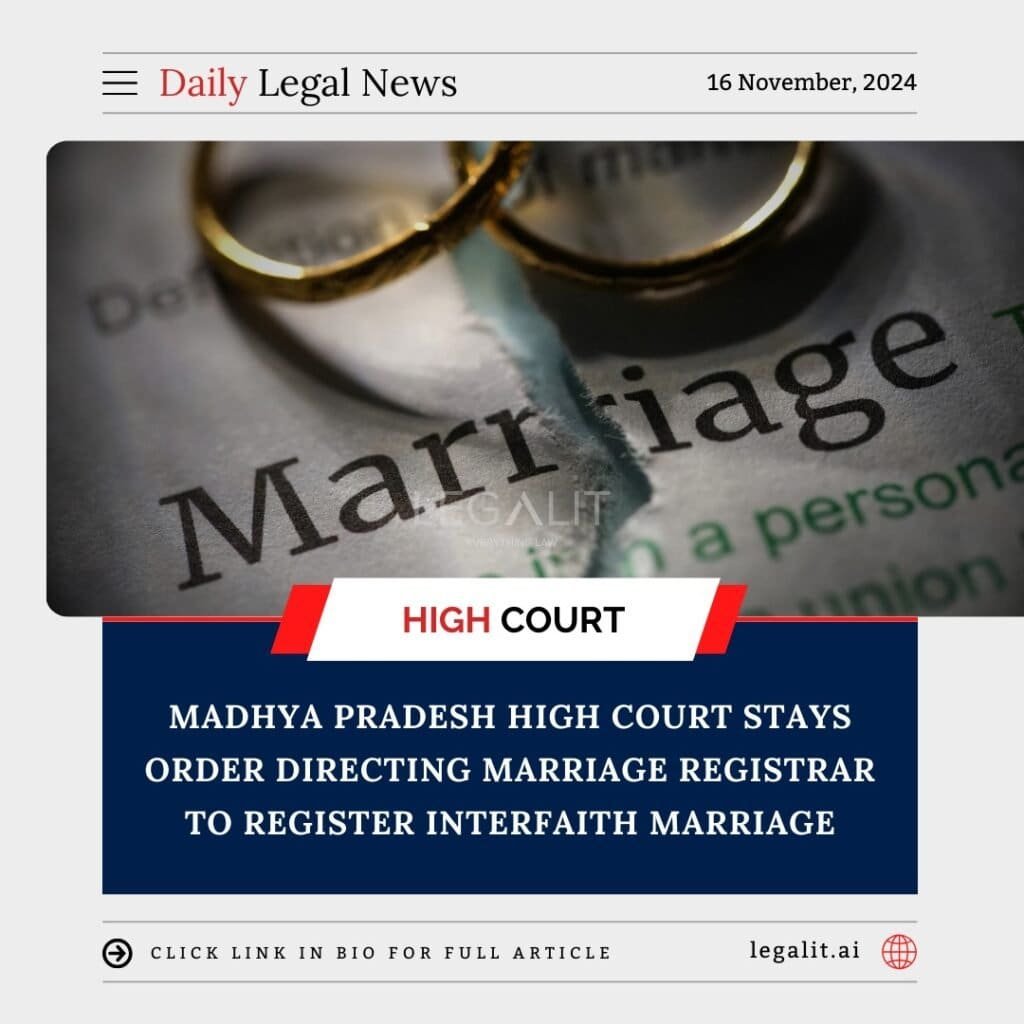
In a significant legal development, the Madhya Pradesh High Court stayed an order that had directed a Marriage Registrar to register an interfaith marriage between two individuals of different religions. The case has sparked debate over interfaith marriages and the legal framework governing them in India.
Background:
The couple in question had sought to register their marriage with the Marriage Registrar, but their request had been initially denied due to the religious differences between them. They approached the court, arguing that their right to marry under the Special Marriage Act should be upheld, despite their differing faiths. The court had earlier issued an order directing the Marriage Registrar to proceed with the registration, which was subsequently stayed by the High Court.
Court’s Rationale:
- Stay of Order: The Madhya Pradesh High Court intervened after the Marriage Registrar challenged the initial order. The court stayed the decision, pending further hearings, while also expressing the need to examine the case in detail. The court emphasized the need for a thorough review of the legal and constitutional implications of interfaith marriages.
- Legal Precedents: The court referred to previous rulings on interfaith marriages, highlighting the constitutional principles of personal freedom, right to choose a spouse, and the protection of individual rights under Articles 21 (Right to Life and Personal Liberty) and 25 (Freedom of Religion) of the Indian Constitution. However, it also acknowledged the complexities surrounding interfaith marriages in the context of state laws and communal sensitivities.
- Delicate Balance: The court stressed the importance of balancing individual rights with the legal framework governing marriages in India, particularly under laws such as the Special Marriage Act, which permits marriage between individuals of different religions.
Legal Considerations:
- Special Marriage Act: Under the Special Marriage Act of 1954, marriages between individuals of different religions are legally recognized, provided both parties give notice of their intention to marry. The Act allows interfaith marriages without the requirement of conversion, making it a vital tool for individuals who wish to marry outside their religion.
- Interfaith Marriages: While interfaith marriages are constitutionally protected as part of an individual’s personal liberty, they often face social and legal hurdles, including resistance from families, communities, and sometimes authorities. This case exemplifies the challenges faced by couples in such unions.
Implications of the Stay Order:
- Impact on Interfaith Marriage Registrations: The stay on the earlier order raises concerns about the ease of registration for interfaith couples, especially in states with strong cultural or religious opposition to such marriages.
- Legal Precedent: The case may set a significant precedent regarding the treatment of interfaith marriages under Indian law, especially in terms of how courts interpret personal freedom and the role of the state in regulating such unions.
- Future of the Case: The High Court’s stay means that the matter will remain in legal limbo until the court reviews the arguments and provides a final ruling. It also indicates that the case could involve a deeper examination of the legal rights of individuals in interfaith marriages.
Conclusion:
The Madhya Pradesh High Court’s decision to stay the order for registering an interfaith marriage reflects the delicate legal and societal balance between individual freedoms and the constraints imposed by laws and social norms. The final ruling will have a significant impact on the legal status of interfaith marriages in India, and the rights of individuals in such unions under Indian law.